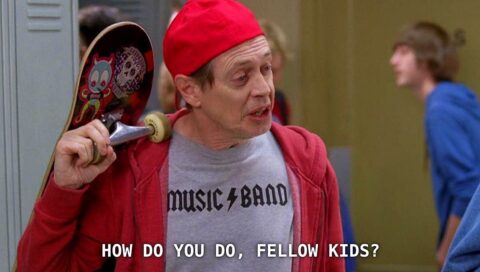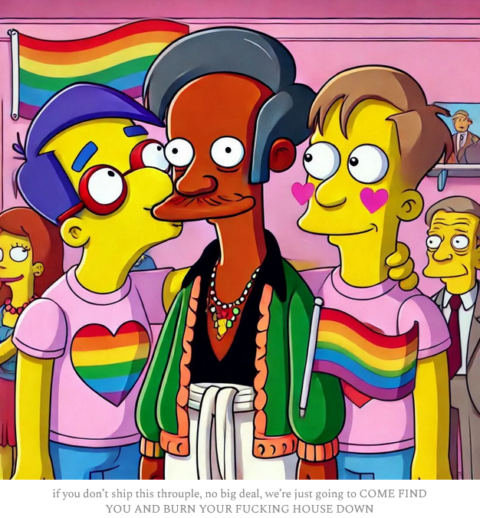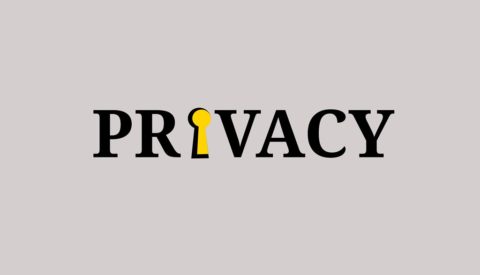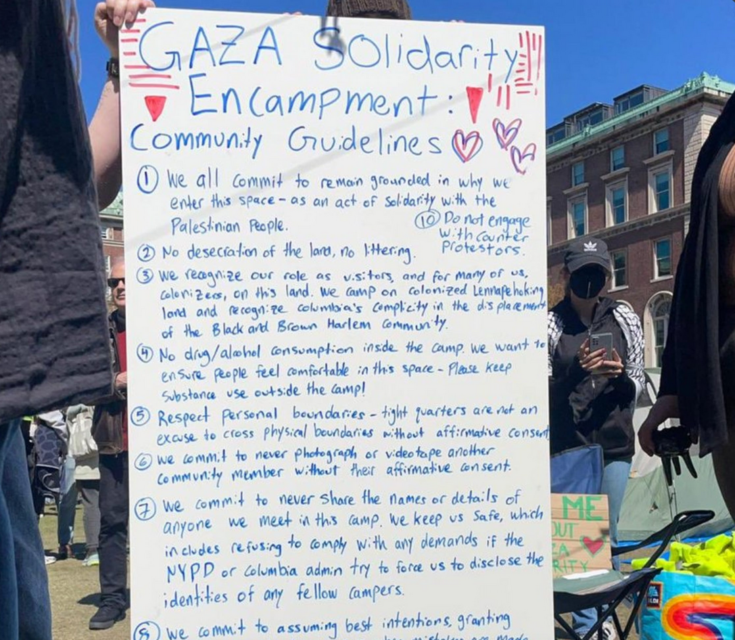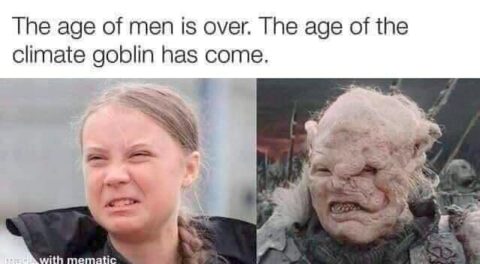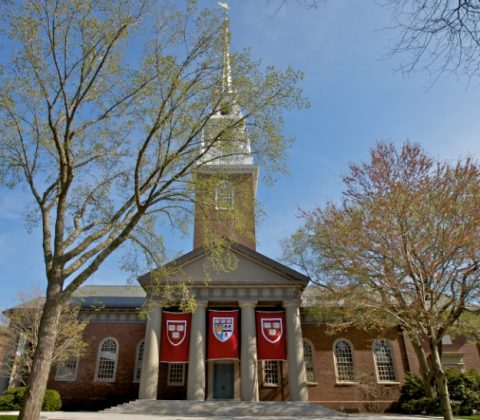Our forefathers, the Boomers, competed for social status the old fashioned way — bigger houses, fancier cars, trendier job titles, younger / hotter / tighter trophy wives, that kind of thing. When Gen X entered the workforce, we couldn’t compete with that, and not (just) because of Boomer narcissism; there were just too few of us. So we invented the “lifestyle striver” method of social competition. We made fun of the corporate ladder-climbers (anyone else remember “die yuppie scum” from the late 80s?) and embraced “authentic” experience.
That’s why everything was suddenly so Xxxtreeeeem!!! in the early 90s through the Naughts. We can’t afford to fly to Gstaad for a ski weekend, but we can buy a snowboard. Dad might be on Wife 3.0 at that point, and she’s younger than us, but our girlfriends — marriage is for squares — are so much more environmentally friendly. We can’t compete with their high-end clothes, so we’ll push for “business casual” in the office, homeless-casual in our personal lives (everyone can afford thrift store flannel). And so on.
The Millennials and Gen Z, lacking the wherewithal to do even that (what with the six figure college debt and all), invented the “persona striver” as their means of intra-group social competition. For the low low price of a smartphone and a data plan, you too can pretend to be The Most Interesting Persyn in the World online. I’m told there are entire subcultures online, “cottagecore” and the like, revolving around aping the style and mannerisms of prior eras. “Anonymous” seems to think that these kids are actually, physically doing this stuff — that the “cottagecore” lesbians really are moving into little houses on the prairie to bake bread by hand — but it’s obvious that’s not necessary, as this is an entirely online thing and Photoshop exists.
Either way, it’s sufficient for our purposes to note that the cost of entry keeps dropping, while the “totalization” (for lack of a better word) of the lifestyle keeps growing. An old-fashioned, conspicuous-consumption style striver was free to be an individual. Yeah, sure, they were all “yuppies”, but there were Protestant yuppies and Catholic yuppies (and atheist yuppies and everything in between). There were Liberal yuppies and Conservative yuppies (and Libertarian yuppies and everything in between). You might find the same few standard books on all their shelves — management meatball crap; the novels of Danielle Steele and Sydney Sheldon — the same way you’d find the same basic kinds of clothes in their closets, but there was still a lot of individual variety within those broad constraints. You could predict a few broad, superficial things about a yuppie from his business card, but there were no safe bets on anything else.
The lifestyle and persona strivers, on the other hand, are much more narrow. While the yuppie might go to Molokai this summer on vacation, next summer to Italy, because why not?, the lifestyle striver was pretty much trapped in his niche — it’s trail hiking or bust. And the persona striver can’t afford to go anywhere, so xzhey have to make up elaborate justifications for it (“by staying home and baking these muffins from an original 18th century recipe, I’m being completely carbon neutral”). It’s no accident, in the Marxist sense, that marathons and Crossfit and all that shit really took off after the turn of the century, as well as the whole “animal rescue” deal — it’s both a lifestyle and a persona, and it costs next to nothing, and you can, indeed must, do it all day every day.
Severian, “Striving for Revolution”, Rotten Chestnuts, 2021-08-11.
January 8, 2025
December 12, 2024
The dispiriting rise of the “kidult”
Freya India explains the need for modern parents to re-embrace some of the more traditional duties of parents in raising children:
It’s pretty much accepted as fact that parents today are overprotective. We worry about helicopter parenting, and the coddling of Gen Z. But I don’t think that’s the full story. Parents aren’t protective enough.
Or at least, what parents are protective about has changed. They are overprotective about physical safety, terrified of accidents and injuries. But are they protective by giving guidance? Involved in their children’s character development? Protective by raising boys to be respectful, by guiding girls away from bad influences? Protective by showing children how to behave, by being an example?
As far as I can see many parents today are overprotective but also strangely permissive. They hesitate to give advice or get involved, afraid of seeming controlling or outdated. They obsess over protecting their children physically, but have little interest in guiding them morally. They care more about their children’s safety than their character. Protective parenting once meant caring about who your daughter dated, the decisions she made, and guiding her in a good direction. Now it just means preventing injury. And so children today are deprived of the most fundamental protection: the passing down of morals, principles, and a framework for life.
One obvious example of this is that adults act like children now. They talk like teenagers. They use the same social media platforms, play the same video games, listen to the same music. Our world moves too rapidly to retain any wisdom, denying parents the chance to pass anything down or be taken seriously, so they try to keep up with kids, who know more about the world than they do. Fathers are “girl dads” who get told what to think. Mothers are best friends to gossip with. The difference between childhood and adulthood is disappearing, and with it, parental protection.
Beyond that, too, there’s this broader cultural message that adults should focus on their own autonomy and self-actualisation. This very modern belief that a good life means maximum freedom, with as little discomfort and constraint as possible, the way children think. Now nothing should hold adults back. They have a right to feel good, at all times. They stopped being role models of responsibility and became vessels of the only culture left, a therapeutic culture, where it’s only acceptable to be protective of one thing, your own mental health and happiness. Listen to the way adults judge decisions now, how they justify themselves. Parents are celebrated for leaving their families because they were vaguely unhappy or felt they needed to find themselves, even at the expense of their children’s security. Adults talk about finding themselves as much as teenagers do. Parents complain online about the “emotional labour” of caring for family, or express regret for even having children because they got in the way of their goals. Once growing up meant sacrificing for family, giving up some of yourself, that was an honour, that was a privilege, and in that sacrifice you found actual fulfilment, broke free from yourself, moved on from adolescent anxieties, and there, then, you became an adult.
But slowly, without thinking, we became suspicious of adulthood. We debunked every marker and milestone, from marriage to children all the way to adulthood itself. Now we aren’t just refusing to grow up but rejecting the very concept of it. Adulthood does not exist, apparently. It’s a scam, a lie, a myth. Adulthood is a marketing ploy, we say, while wearing Harry Potter merch and going to Disneyland. Adulthood is a performance, apparently, that’s going out of style. “There is nothing, there is nobody which/who would really justify the claim ‘you have to grow up’,” seems to be the sentiment. “For whom? for what?”
December 9, 2024
October 8, 2024
Young Canadians turn right – “the average Canadian 21-year-old is more conservative than the average Canadian 65-year-old”
I don’t have a lot of contact with twenty-somethings, as my son’s friends are now in their 30s, so I’m just as surprised as anyone else to hear that younger Canadian voters seem to be switching their preferences to the right unlike most young voters around the world:
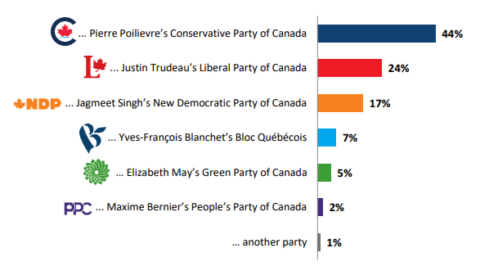
Voting intentions among Canadians, September 2024.
Detail from a recent Leger poll.
In one of the more surreal twists of sky-high Canadian public dissatisfaction, the country now ranks as one of the world’s only places in which young people are supporting conservative parties at rates well beyond those of their parents.
A Leger poll from last month found that Conservative support was stronger among voters aged 18-34 than any other age cohort. The under-34s backed the Tories by 47 per cent, as compared to 45 per cent for those aged 35-54, and 41 per cent for voters over 55.
The phenomenon has also started to show up at the provincial level. With about two weeks to go until the B.C. election, the B.C. Conservatives have been put in sight of a majority government due largely to an unexpected wave of youth support.
According to a Sept. 30 Leger poll, voters under 34 were backing the B.C. Conservatives by 47 per cent as compared to the 39 per cent who intended to vote NDP. Among voters over 55, the allegiances were reversed: 48 per cent supported the NDP against 43 per cent for the Conservatives.
Nothing like this has really happened before — at least as long as Canada has had age-stratified opinion polling.
It’s not the first time that a majority of young voters have flocked to a conservative option. The Progressive Conservative landslides of 1958 and 1984 were both secured in part by winning over voters under 30.
But what’s happening now appears to be the first time that the average Canadian 21-year-old is more conservative than the average Canadian 65-year-old.
For now, at least, the phenomenon is somewhat unique to Canada. In the rest of the Anglosphere, political sentiments are still hewing to their traditional pattern of young people leaning progressive, with old people leaning conservative.
The current U.S. presidential election has Democratic candidate Kamala Harris commanding up to 60 per cent of the under-30 vote, as compared to roughly one third of young voters who said they would vote for Republican nominee Donald Trump.
In the U.K., the July general election found that support for right-wing options was directly proportional to the age of the voter. A mere 17 per cent of British voters under 24 voted either for the Conservatives or the populist Reform UK. Among Brits over 70, those same parties commanded a smashing 61 per cent.
In Australia, a recent YouGov poll asking voters if they wanted “more socialism” found that 53 per cent of Australians under 24 did.
July 29, 2024
W.H. Smith attempts to rebrand their stores to “raise awareness” or something
British bookseller from time immemorial, W.H. Smith, apparently decided that the corporate branding they’d been using since the 18th century was just too boring for modern consumers, so they brainstormed a daring new design for the 21st century … that sucked.
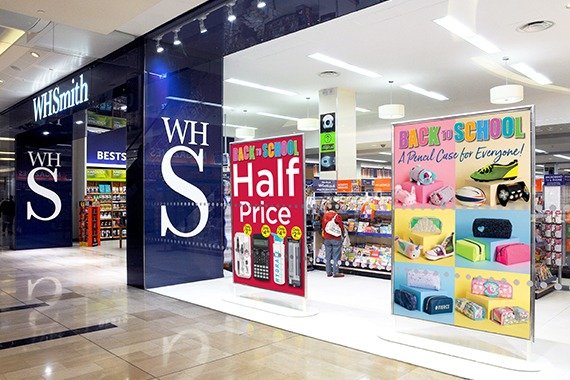
“UK High Street” from https://www.whsmithplc.co.uk/media/media-gallery/images
When the British retailer, W.H. Smith, rebranded its logo last year, confusion and bafflement ensued.
The high street fixture, its Times New Roman logo mostly unchanged since 1792, earned its reputation by selling books, stationery, and for fleecing bleary-eyed travellers in airports. Through sheer zombie persistence, W.H. Smith remains a constant of British retail. Never mind the threadbare carpets, the general dilapidation, or the desperate staff forced to offer you a bottle of knock-off perfume with your twenty Lambert and Butler.
W.H. Smith endures because its business model concentrates on a captive audience. Go to an airport or a hospital — any place in which people cannot escape — and you’ll find a W.H. Smith reliably charging double for a Lucozade Sport. W.H. Smith will outlive Great Britain. The retailer’s existence — puzzling to the most scientific of minds — defies natural law.
Last year, creative designers attempted to play God. They sanded off the logo’s regnant edges and stripped “Smiths” altogether. The dynamic branding screamed minimalism: a plain, white “WHS” stamped on to a blue background.
I’d imagine the big revelation underwhelmed those paying for the work. “That’s interesting.” Or “It’s certainly different“.
Mockery ensued. “Baffling” said one. “It looks like the NHS logo,” observed another.
No doubt the designers plotted a revolution in design. Of course, these “creatives” — invariably young and invariably uncreative — fancied their vandalism as “forward thinking” and “dynamic”. I’ll wager at least one thought the new logo addressed the plight of some faraway progressive cause to which they subscribe. The public, unschooled in the most voguish developments in design, concluded: The new logo is shit.
W.H. Smith soon backtracked. Passive-aggressive defences of the staid new logo melted into sulky denial. It’s just a trial, they mewled.
A breathless spokesman revealed the truth. Or some addled version of the truth. The fresh signs, they revealed, were “designed to raise awareness of the products W.H. Smith sells”. What else, I wonder, is a shop sign meant to achieve?
The phrase “raising awareness” is one of a litany of linguistic evasions which say nothing. By shoehorning that ghastly phrase into a sentence, the speaker hopes to evade criticism. Reader, I’m not ploughing through a duty-free bottle of Chateau le Peuy Saincrit in the obscene Bulgarian sunshine. I’m raising awareness of the plight of southern French winemakers.
That passive-aggressive statement of the obvious — our shop sign raises awareness of our shop — you plebeian fools — crystallises the creative industry’s age problem.
Three-quarters of the creative industry is under 45. Perhaps this age gap (not the sexually consensual and fun kind) explains why so much of what we see and hear is cliché-riddled evasive hoo-hah.
When talking to anyone under 45, I mentally add a question mark to the end of their sentence. Millennials and Zoomers avoid declarative sentences. Listen. Almost every utterance sounds like a question. Further to this quirk, I note the adverbs and filler words. Young people stuff their speech with “basically”, “actually”, “literally”, and “like”. Zoomers are especially militant. They eschew capital letters. Capital letters are grammatical fascism. Full stops reveal a latent proclivity for Zyklon-B. Influencers add another tic to this repertoire of anxiety and unsurety. They crackle their voice as if a frog has lodged in their throat.
May 25, 2024
“Education” versus “learning”
At Astral Codex Ten, Scott Alexander discusses some of the ideas from Bryan Caplan’s book The Case Against Education:
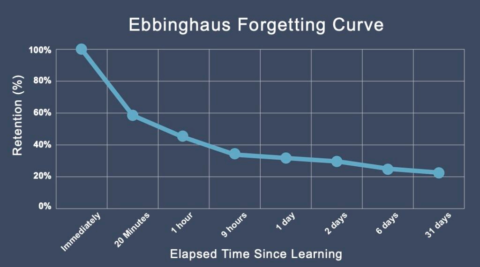
Source here. Note deranged horizontal axis.
Education isn’t just about facts. But it’s partly about facts. Facts are easy to measure, and they’re a useful signpost for deeper understanding. If someone has never heard of Chaucer, Dickens, Melville, Twain, or Joyce, they probably haven’t learned to appreciate great literature. If someone can’t identify Washington, Lincoln, or either Roosevelt, they probably don’t understand the ebb and flow of American history. So what facts does the average American know?
In a 1999 poll, only 66% of Americans age 18-29 knew that the US won independence from Britain (as opposed to some other country). About 47% of Americans can name all three branches of government (executive, legislative, and judicial). 37% know the closest planet to the sun (Mercury). 58% know which gas causes most global warming (carbon dioxide). 44% know Auschwitz was the site of a concentration camp. Fewer than 50% (ie worse than chance) can correctly answer a true-false question about whether electrons are bigger than atoms.
These results are scattered across many polls, which makes them vulnerable to publication bias; I can’t find a good unified general knowledge survey of the whole population. But there’s a great survey of university students. Keeping in mind that this is a highly selected, extra-smart population, here are some data points:
- 85% know who wrote Romeo and Juliet (Shakespeare)
- 56% know the biggest planet (Jupiter)
- 44% know who rode on horseback in 1775 to warn that the British were coming (Paul Revere)
- 33% know what organ produces insulin (pancreas)
- 31% know the capital of Russia (Moscow)
- 30% know who discovered the Theory of Relativity (Einstein)
- 19% know what mountain range contains Mt. Everest (Himalayas)
- 19% know who wrote 1984 (George Orwell)
- 16% know what word the raven says in Poe’s “The Raven” (“Nevermore!”)
- 10% know the captain’s name in Moby Dick (Ahab)
- 7% know who discovered, in 1543, that the Earth orbits the sun (Copernicus)
- 4% know what Chinese religion was founded by Lao Tse (Taoism)
- <1% know what city the general Hannibal was from (Carthage)
Remember, these are university students, so the average person’s performance is worse.
Most of these are the kinds of facts that I would expect school to teach people. Some of them (eg the branches of government) are the foundations of whole subjects, facts that I would expect to get reviewed and built upon many times during a student’s career. If most people don’t remember them, there seems to be little hope that they remember basically anything from school. So what’s school even doing?
Maybe school is why at least a majority of people know the very basics – like that the US won independence from Britain, or that Shakespeare wrote Romeo and Juliet? I’m not sure this is true. Here are some other questions that got approximately the same level of correct answers as “Shakespeare wrote Romeo and Juliet“:
- What is the name of the rubber object hit by hockey players? (Puck, 89%)
- What is the name of the comic strip character who eats spinach to increase his strength? (Popeye, 82% correct)
- What is the name of Dorothy’s dog in The Wizard of Oz? (Toto, 80% correct)
I don’t think any of these are taught in school. They’re absorbed by cultural osmosis. It seems equally likely that Romeo and Juliet could be absorbed the same way. Wasn’t there an Academy-Award-winning movie about Shakespeare writing Romeo and Juliet just a decade or so before this study came out? Sure, 19% of people know that Orwell wrote 1984 – but how many people know the 1984 Calendar Meme, or the “1984 was not an instruction manual!” joke, or have heard of the reality show Big Brother? Nobody learned those in school, so maybe they learned Orwell’s name the same place they learned about the other 1984-related stuff.
Okay, so school probably doesn’t do a great job teaching facts. But maybe it could still teach skills, right?
According to tests, fewer than 10% of Americans are “proficient” at PIIAC-defined numeracy skills, even though in theory you need to know algebra to graduate from most public schools.
I took a year of Spanish in middle school, and I cannot speak Spanish today to save my life; that year was completely wasted. Sure, I know things like “Hola!” and “Adios!”, but I also know things like “gringo” and “Yo quiero Taco Bell” – this is just cultural osmosis again.
So it seems most people forget almost all of what they learn in school, whether we’re talking about facts or skills. The remaining pro-school argument would be that even if they forget every specific thing, they retain some kind of scaffolding that makes it easier for them to learn and understand new things in the future; ie they keep some sort of overall concept of learning. This is a pretty god-of-the-gaps-ish hypothesis, and counterbalanced by all the kids who said school made them hate learning, or made them unable to learn in a non-fake/rote way, or that they can’t read books now because they’re too traumatized from years of being forced to read books that they hate.
It’s common-but-trite to encounter people who say things like “I love learning, but I hated school” — I’ve undoubtedly said that myself many times. A weird experience was having to study a book in school that I’d already read on my own: it was like an early form of aversion therapy … here’s something you loved once, let’s make you hate it now.
May 20, 2024
April 26, 2024
Out – “GenZ”: In – “Waffen ZZ“
Peachy Keenan invites us to meet the new hotness, the Zoomerwaffen:
These crazy Zoomer kids are bringing back all the old trends: baggy jeans, the band Sublime, and casual, no-big-deal, fanatical anti-semitism. When I was in college, the only people who still hated Jews were Arabs and skinheads. In 2024, hating Jews is even cooler than having retarded pronouns!
“Never again” was the promise Jews made to themselves after the Holocaust and it held for almost 80 years, but it looks like we are in fact about to do it again. It’s starting, ironically, on the same elite college campuses that were the birthplaces of the “inclusion” movement of recent years. Our finest universities have spent the last 30-odd years “abolishing hate”, establishing “safe spaces”, and forcing tolerance down students’ throats until they gagged on it.
But also we have to acknowledge that demands from Jewish students for special protections against hate speech, harassment, violence, and bigotry, while totally justified, tend to stick in the craw of other identity groups who have been the target of widespread vilification and hate on campus for years, right here in the United States.
The Zoomerwaffen are here and they are coming for the Jews — the same way their college came for the straight white males.
Zoomerwaffen SS officer Klaus Von Chad in his Amazon keffiyeh cheers as the American flag is taken down and burned.
Yes, some of the Zoomerwaffen even look like Nazis, apparently. These wild-eyed Ivy League coeds have taken a break from rizzing each other up and accidentally overdosing on fentanyl so they can goof around in keffiyahs, call for the slaughter of a persecuted religious minority, and ululate in their Lululemons as they are arrested for insurrection. (Insurrection is good now, Grandpa!).
I had to laugh when I saw Ilhan Omar’s unfortunate daughter arrested at Columbia for leading some anti-semitic protest. Bit on the nose, even for the Omar family, isn’t it? Ilhan’s little nepo meeskite got kicked out of her dorm and suspended from school, which means she can expect a job offer from MSNBC any minute now.
Since October 7th, Jews have been under attack everywhere and literally Hamas has replaced BLM as the coolest club in America for progressive, “love is love”, white kids.
Welcome to the Swiftie-to-Jihadi pipeline!
April 18, 2024
QotD: The intergenerational blame game
I believe it’s related to pensions, Medicare, and the whole Social Security scam. Boomers paid into these funds with the naive but innocent understanding that their money would be returned. Instead, the government spent it on other frivolities such as wars for Israel and keeping the Federal Reserve happy, so there’s no money left, and naturally the younger generations will have to pay. I believe that the elites want to get the younger generations so angry at the Boomers that they cut off what was promised to them — so angry, they dream of the day that Boomers get murdered in nursing homes.
OK, Zoomer. Two can play this game. Keep in mind that the little magic trick I’m about to perform here does not mean I’m blaming your generation for any of these things, because I’m not a Generational Astrologist. I’m merely taking what you do and flipping the script:
Yours is the generation of “woke culture” and Antifa. As much as you yabber about how the Boomers let the culture slide into liberalism, atheism, and degeneracy, your generation is far less religious than the Boomers. You lean heavily socialist and encourage “punishment” for Halloween costumes you deem “offensive”. While the world is burning, the Zoomers’ top three voting issues are emotionally laden trifles such as “mass shootings, racial equality, and … treatment of immigrants”. You are far more anti-racist, anti-“hate”, and pro-LGBT than any generation that preceded you. This is not my opinion — it’s a statistical fact supported by every survey and poll I’ve ever seen.
Therefore, every Zoomer is personally responsible for Drag Queen Story Time and the fact that there’s no wall on the border, because you just sat there and LET it happen. Three trillion dollars have been added to the national debt since Trump’s inauguration, and you Millennials and Zoomers just sat there and LET it happen. The tech giants are doing purges of people for thoughtcrimes, while your generation hides behind goofy fake names and clown avatars and LETS it happen.
That’s because every member of every generation is 100% responsible for what happens on its watch. Get down on your knees and APOLOGIZE!
And if you don’t repent immediately and bend to my shaming tactics, you fucking deserve all the righteous pain the generations after you will rain down on your selfish head.
See how stupid that sounds when it’s applied to you?
People hate to admit they’ve been brainwashed. But sorry — you’ve been brainwashed.
Politicians enjoy a little generational warfare if it suits their needs. They’ll even instigate it. And as far as I can tell, this sudden emergence of a generational identity-politics civil war is a divide-and-conquer tactic that has worked wonderfully.
Jom Goad, “The Myth of Boomer Privilege”, Taki’s Magazine, 2019-11-03.
March 25, 2024
QotD: Generational politics
The major theme of my writing is guilt — how blaming others is maliciously used as a disabling mechanism and how people and cultures toss it around like a hot potato. No one, unless they’re masochists or are trying to earn social-approval points, ever wants to accept guilt — they want to tie it around someone else’s neck and let them sink to the bottom of the lake with it. This is why I believe Christianity has such perennial appeal — because Jesus takes the rap for you.
I’ve been making this point for years, but you’ve all been too busy projecting your guilt onto others and blaming them for all your problems to listen to me.
The reason I get fixated on certain topics is because they in some way powerfully reflect this theme of misplaced blame. This may burst quite a few of your bubbles, but the fact that I’ve focused on the endless bashing of whites for years is not a sign of how deeply in love I am with white people but rather a fascination with the fact they’re getting blamed for many things that demonstrably aren’t their fault. It’s the same reason I focus on the gender wars — men nearly aren’t as awful as they’re being depicted, and women are nowhere near as innocent as the current narrative says they are.
If you haven’t been paying attention, there’s been escalating intergenerational hostility across our fair land, and people are increasingly identifying with dumb, media-manufactured generational names — AKA Baby Boomers, Gen X, Millennials, and Gen Z — as if they were scientific categories that are predictive of human behavior rather than arbitrary designations along the lines of Virgo, Capricorn, Scorpio, and Leo.
It’s some weird new metastasized form of identity politics. And, since it comes with the turf, these groups are blaming each other for all that ails the world.
It’s dumber than astrology […] but this intensely stupid way of framing the world refuses to die.
Jom Goad, “The Myth of Boomer Privilege”, Taki’s Magazine, 2019-11-03.
January 28, 2024
Adolescence is “a profoundly unnatural life-stage”
Sarah Hoyt on the plight of the younger Millennials and the Gen Z kids in our over-supervised safety-at-all-costs culture today:
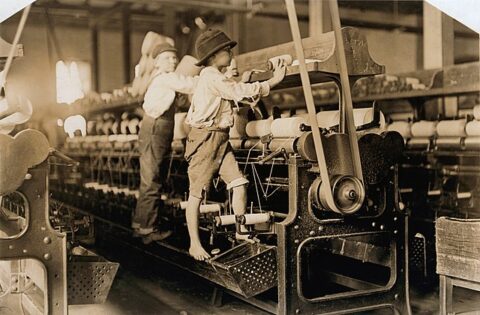
Child labour laws did generally get younger children out of dangerous places like mines, mills, and factories. Modern child labour laws instead keep young adults from gaining work experience in many cases.
Photo of pre-teen children working in a mill in Macon, Georgia in 1909. Photo NCLC.01581, Library of Congress via Wikimedia Commons.
Mostly, it gets attributed to “kids these days” but unless you have kids, these days, you don’t know how they are bound. And even if you do, you might not realize it, because all you see is the infantilization of a generation, and not that they, themselves, aren’t the ones doing the infantilizing, but all those “good rules” and regulations and laws are doing it.
I realized about 10 years ago that my son’s generation was about 10 years behind where we were. In their mid twenties they were doing things we did in our teens. It was disconcerting. And even I had no idea why, other than too much regimentation in school, too much of a never end of button counting, and not enough room or freedom to think or be on their own.
Since then … I’ve seen more. And a lot of the reason they are younger than we were is that the entire world is geared not to let them grow up. I mean, let’s be glad that — unprepared or not — they’re legal adults at 18, or people would be denouncing them for walking alone down the street, without an “adult” at 25.
There’s also … adolescence is in some ways a profoundly unnatural life-stage, and more or less invented in the 20th century. In the past, sure, people were children, and people grew to be adults, but there wasn’t this protracted time period where they were adults in size and at least some ability, but weren’t allowed to be adults: they weren’t allowed to earn or spend, or make their own decisions, for years.
The earn or spend thing is important. Kids used to grow along with their tasks. Read Tudor or colonial memoirs, and you find four year olds looking after cows or horses, or learning Latin, or other unlikely things even for twelve year olds in our time.
Mom went to work at 10 and started getting a salary. It wasn’t much, and 90% of it went to her parents’ budget. But she was working, holding down a job, doing things that were maybe not at adult level, but could lead to it, eventually, if she applied herself. This was normal for her generation. In my own generation, amid the working class, most people went to work at 10. Heck, amid the middle class, most people went to work at 15 or so, after 9th grade. Were they more mature than the rest of us that went all the way to college?
I wouldn’t have thought that at the time, but yes, of course they were. Most of my elementary school classmates were married, with kids by the time my biggest worries were final exams. Of course, with my intellectual pride I looked down on them but now I understand they were managing a very difficult job, which at the time I could not have done.
I always feel stunned and shocked when someone says the kids should be “holding down two jobs like I was at 16” or “working to pay their way through college”. (That last is a giggle as it has two impossibilities. Finding a job that pays enough after college which has a lot of make-work expectations, and making a full-time middle-class salary, which is what college costs these days.) Two Jobs. At 16. The difficulties in giving work to 16 year olds, increasingly restriction of hours, etc. combined with chaotic scheduling in the only unskilled jobs remaining (mostly just retail) means that until recently none of them could find A job. Let alone two. And the recently was during Covid. I haven’t seen so many little 16 year olds cashiering, or serving at tables recently. And that’s because most people I’m seeing are around my age: I guess unemployment is biting hard.
But you know, all these strong rules against “child labor” mean that most kids hit 18 or, if they’re going to college, 22 or — more likely, as most degrees (remember make work?) are taking 6 or 7 years — 24, with absolutely no job experience. Which means their applications aren’t even looked at. Not seriously.
Honestly, almost every young person — particularly young men — I know who found a job, and is doing relatively well, did so through contacts. Through friends of friends. Through knowing someone.
This is a bad sign, because it’s how Portugal functions, and it is not in any way shape or form meritocracy, which in turn contributes to other things falling apart.
But more and more what I’m seeing is young people hitting their mid twenties lost, and doing this, and doing that, and trying this and trying that, and nothing ever gels. To make things worse, they don’t have the habits mom had by 10, because they haven’t been allowed to acquire them.
There was a similar generation — one, while here we’re well into two — in Portugal, where unemployment was so bad (the generation before mine) that most people weren’t “established” on a path till their mid thirties. I’d guess about half of them never got the knack of it: of the day to day of working, fulfilling the work duties, just … the unglamorous day to day that makes us adults.
December 15, 2023
QotD: Delayed onset adulthood
Don’t even get me started on supposedly-adult men of voting age who are infatuated with My Little Pony (a.k.a. “Bronies”). Great Napoleon’s bleeding ulcers, it actually turns my stomach to read about these fucking losers.
At the risk of sounding all White Christian Male and stuff [irony alert], allow me to remind everyone of this excellent precept from Corinthians:
When I was a child, I spake as a child, I understood as a child, I thought as a child: but when I became a man, I put away childish things.
Except that men aren’t doing any of that. Instead, they’re clinging to the artifacts of their childhood, hoping that Mommy will be there to keep the Big Bad Wolf/Zombies away.
What will inevitably happen is calamity. As Charles Norman puts it: “The world is running out of grown-ups. It will probably take tragedies and a prolonged era of diminished affluence for people to grow up.”
Like I said: calamity.
Kim du Toit, “Kiddies”, Splendid Isolation, 2019-08-22.
November 24, 2023
It sometimes seems that the only thing that isn’t “violence” these days is actual violence
David Sedaris at The Free Press:
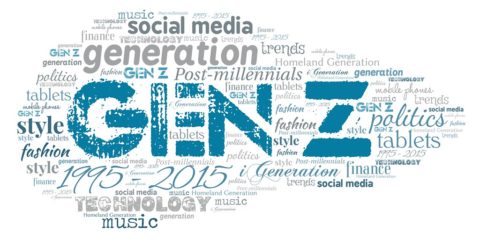
“Gen Z” by EpicTop10.com is licensed under CC BY 2.0
Words, we are now regularly reminded, are violence. So too is silence. I read not long ago that capitalism is violence, as is misgendering someone. Ignoring someone is violence, but so too is paying them attention. A friend recently called on one of her assistants to deliver a statistic during a business meeting and was later charged with “casual violence”. Apparently Deborah needed to give advance warning that she was going to ask a question, one that might possibly put her employee — someone who was well paid to know stuff and be able to spew it forth — on the spot.
Who are these hothouse flowers, all so easily and consistently wounded? People whose parents never hit them, that’s who. People who don’t know what real pain is, but still want to throw the word around. When I was a child, a slap across the face was too minor to qualify as “casual violence”. It was simply what you got for talking back or holding everyone up. It never hurt all that much; what stung was the swiftness of it, the surprise. Who knew my mother could move so fast, like someone belted in the martial arts. I don’t feel like it traumatized me to be knocked around a little. Blood was rarely drawn. No limbs were broken. Could my parents have made their point without resorting to violence? Probably, but it would have taken more time, and with six kids to dress and get out the door that was a precious commodity. I see parents now who worry they’re being abusive if they don’t spend at least an hour putting their child to bed. An hour! I said to my sister, Amy, “Do you remember ever once being tucked in? Can you imagine Mom and Dad reading to us, or singing? Can you imagine them kissing us?”
“Ugh,” she said. “Stop!”
And look at us! We’re fine. We can handle stuff. We never get offended by anything.
Our parents thought we were okay, at best, and I think that really helped us in the long run. Ask someone now if they have kids, and they’re pretty much guaranteed to use the word amazing, as in “I have an amazing six-year-old daughter.”
“Amazing because she just discovered a cure for herpes or because she speaks three words of Spanish,” I always want to ask. “I mean, just how low have you set that bar?”
One of the worst things that’s happened to us as a country is that people are having fewer children — 1.8 as opposed to five 50 years ago. Sure, it’s good for the environment — fewer people means less demand for resources. The problem is that single children receive a freakish amount of love and attention. Most graduate at least twelve times before leaving high school. Their every move is recorded and celebrated, and it gives them an outsize sense of their own importance.
The solution isn’t for every couple to start having five kids again, but maybe for one chosen couple to have five, and the other four couples to go without — either have a full litter you can’t pay that much attention to, or nothing at all.
If our schools are a mess it’s in large part due to these parents who think their kids are special, who get mad if you contradict their brilliance, if you give them a bad grade or, God forbid, try to take their phones away. Had one of my teachers told my mother that I was acting up in class, she’d have said, “Thank you so much for letting me know.” Then she’d have come to wherever I was — in front of the TV, or at the side of the TV making my way to the front of it — and slapped my sister Gretchen so hard her eyes would have crossed.
“What was that for?” Gretchen would have asked.
“Oops, wrong kid,” my mother would have said. Then she’d have slapped me twice as hard to make up for her mistake.
November 15, 2023
Can we criticize the Climate Goblin now?
Brendan O’Neill asks if it’s allowed to criticized Greta “The Climate Goblin” Thunberg now:
Can we criticise Greta Thunberg now? For a time, anyone who raised even the mildest objection to the pint-sized prophetess of doom risked being damned as a bully. Surely this moratorium on Greta-scepticism will end following her platforming – to use woke lingo – of an activist with very iffy views. An activist who has trivialised the Holocaust and seems pretty chilled about Hamas’s pogrom of 7 October. Calling out Greta for her fact-lite blather about the planet being “on fire” may have been forbidden – pulling her up for hanging out with Holocaust relativists must not be.
Thunberg has made waves by switching her focus from saving the planet to saving Gaza. Like every other Gen Zer with a TikTok and an insatiable urge to signal his / her / zir virtue to the world, she’s become an overnight authority on Israel-Palestine. She posed with a placard saying “Stand with Gaza“. She turned Fridays for Future – where pious rich kids bunk off school to raise awareness about climate change – into “Justice for Palestine” stunts. And on Sunday, she made a climate protest in Amsterdam pretty much all about Palestine.
She invited activists to the stage. One was Sara Rachdan, a Palestinian studying in Amsterdam. It didn’t take German newspaper Bild long to discover that Ms Rachdan holds views which – how should we put this? – are not very pleasant. On Hamas’s pogrom, Ms Rachdan said: “This is finally Palestinians taking action [against] the occupation”. She’s dabbled in Holocaust denigration. She shared a blood-spattered graphic comparing Israel’s actions in Gaza with the Nazis’ actions in Auschwitz. Repulsively, it implies the Jewish State is worse than the Nazis. Where 127 kids a day were killed in Auschwitz, 178 a day are currently dying in Israel’s war in Gaza, it alleges.
Shorter version: the Jews are more accomplished child-killers than even Hitler’s henchmen were. This is rank Holocaust relativism. Comparing the greatest crime in history to this horrendous war denudes that crime of its unique horror. It renders it ordinary. It was no big deal – just the same kind of thing you see on your TV screens every night from Gaza. The implication of moral equivalence between the Nazis’ minutely planned gassing of Jewish children and the deaths of Palestinian kids as a terrible byproduct of Israel’s war on Hamas is beyond immoral. It is the gravest of inversions, treating the Jewish State’s war against anti-Semitic mass murderers as indistinguishable from the Nazis’ acts of anti-Semitic mass murder.
Of course, there’s nothing to suggest Greta shares Ms Rachdan’s views. But isn’t her woke generation obsessed with “platforming”, with only rubbing shoulders with the perfectly politically correct and no one else? Indeed, Thunberg ostentatiously flounced out of the Edinburgh Book Festival earlier this year because it received funding from a firm that invests in fossil fuels. Take oil money and she’ll dodge you like the plague; describe an anti-Semitic pogrom as an act of resistance and she’s all over you like a cheap suit. Care to explain, Greta?
November 13, 2023
Carefully trained and shaped hollow people
At Ricochet, David Foster talks about how today’s university students have become … hollow:
I’ve been writing for years about the rise of toxic ideologies on America’s college campuses – totalitarian, anti-Israel, outright anti-Semitic – but still have been surprised by what has happened in these places since October 7. We need to discuss the reasons why it’s gotten so bad.
A few days ago, someone republished an essay, written in 2016, by a professor who has taught at several “elite” colleges. Excerpt:
My students are know-nothings. They are exceedingly nice, pleasant, trustworthy, mostly honest, well-intentioned, and utterly decent. But their brains are largely empty, devoid of any substantial knowledge that might be the fruits of an education in an inheritance and a gift of a previous generation. They are the culmination of western civilization, a civilization that has forgotten nearly everything about itself, and as a result, has achieved near-perfect indifference to its own culture. It’s difficult to gain admissions to the schools where I’ve taught – Princeton, Georgetown, and now Notre Dame. Students at these institutions have done what has been demanded of them: they are superb test-takers, they know exactly what is needed to get an A in every class (meaning that they rarely allow themselves to become passionate and invested in any one subject); they build superb resumes. They are respectful and cordial to their elders, though easy-going if crude with their peers. They respect diversity (without having the slightest clue what diversity is) and they are experts in the arts of non-judgmentalism (at least publically). They are the cream of their generation, the masters of the universe, a generation-in-waiting to run America and the world.
And when someone has devoted the first 18 years of their lives in large part to jumping through hoops in hopes of making a good impression on some future college admissions officers … and then, in many cases, having to get good ratings from professors whose criteria are largely subjective … that someone is unlikely to develop into a person with a strong internal gyroscope. Quite likely, they are likely to be subject to social pressures and mass movements.
Someone at X said that the Cornell student arrested for making threats against Jewish students was probably just trying too hard to fit in and win approval of his peers and took it a step too far. My view is that there’s no just about it … the desire to fit in and win approval is very often the reason why people commit evil acts. I’m reminded of something CS Lewis said: “Of all the passions, the passion for the Inner Ring is most skillful in making a man who is not yet a very bad man do very bad things“.
The above sentence is from a talk that Lewis gave at King’s College in 1944. Also from that address:
And the prophecy I make is this. To nine out of ten of you the choice which could lead to scoundrelism will come, when it does come, in no very dramatic colours. Obviously bad men, obviously threatening or bribing, will almost certainly not appear. Over a drink, or a cup of coffee, disguised as triviality and sandwiched between two jokes, from the lips of a man, or woman, whom you have recently been getting to know rather better and whom you hope to know better still — just at the moment when you are most anxious not to appear crude, or naïf or a prig — the hint will come. It will be the hint of something which the public, the ignorant, romantic public, would never understand: something which even the outsiders in your own profession are apt to make a fuss about: but something, says your new friend, which “we” — and at the word “we” you try not to blush for mere pleasure — something “we always do”.
And you will be drawn in, if you are drawn in, not by desire for gain or ease, but simply because at that moment, when the cup was so near your lips, you cannot bear to be thrust back again into the cold outer world. It would be so terrible to see the other man’s face — that genial, confidential, delightfully sophisticated face — turn suddenly cold and contemptuous, to know that you had been tried for the Inner Ring and rejected. And then, if you are drawn in, next week it will be something a little further from the rules, and next year something further still, but all in the jolliest, friendliest spirit. It may end in a crash, a scandal, and penal servitude; it may end in millions, a peerage and giving the prizes at your old school. But you will be a scoundrel.
So yes, the passion for approval has always existed. But I feel sure it is much stronger, or at least has fewer countervailing forces, among people who experience today’s college admissions race and its eventual fulfillment.
The students about whom the professor wrote in the essay linked above have not only been encouraged to devote their time to hoop-jumping, they have also been told again and again that their country and their society are evil – that their ancestors were evil, and their parents are probably evil as well. And that practically all aspects of culture more than five years old, whether traditional songs and folktales or classic movies, are harmful and certainly unworthy of study except for purposes of deconstructing their bad examples. And, of course, relatively few of these students are influenced by or have seriously studied any traditional religion.

